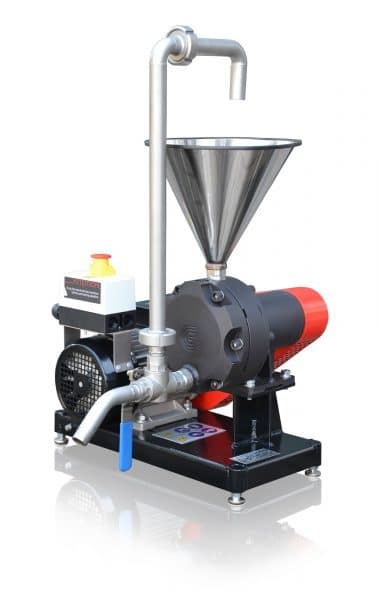Bitumen Emulsion Laboratory System CLM-100.1

The CLM-100.1 colloid mill is specifically engineered for homogenizing and emulsifying liquid materials, particularly thick suspensions with high shear tension, within laboratory conditions. Its primary application lies in bitumen emulsion production.
Beyond this, the machine offers versatility in various industrial applications, including the preparation, dissolution, and processing of a wide range of materials.
SPECIFICATIONS
| No | Parameter | Value |
| 1 | Processing rate, liters/batch (gallon/batch) | 2…4 (0.5… 1)* |
| 2 | Input volume, liters (gallons) | 5 (1.3) |
| 3 | Kinematic viscosity, mm2/sec, max | 150 |
| 4 | Max process temperature, °С (°F) | 180 (356) |
| 5 | Shaft seal type | Mechanical |
| 6 | Rotor/stator tooling | Nozzle |
| 7 | Spare knives kit | Optional** |
| 8 | Knife axial gap preset, mm (in) | 0,2…2 (7.8·10-3… 7.8·10-2) |
| 9 | Knife radial gap, mm (in) | 0,25 (9.8·10-3) |
| 10 | Knife rotation velocity, m/sec (in/sec), max | 45 (1770) |
| 11 | Mill shaft and bearing rotation speed, rpm | 6650 |
| 12 | Electric motor shaft speed, rpm | 2770 |
| 13 | Drive power, kW | 2.2 |
| 14 | Power voltage, V | Custom |
| 15 | Dimensions, mm (in), max: | |
| 550 (22) | |
| 600 (24) | |
| 750 (30) | |
| 16 | Weight, max, kg (lbs) | 70 (154) |
ADVANTAGES
- Processing a diverse array of materials is facilitated.
- The mill can be fitted with different rotor/stator tooling configurations to suit the material and process requirements.
- Optimal intensity of mechanical and thermal processing is achieved by selecting the appropriate rotor/stator tooling and number of stages.
- Tooling options include single or multiple parts, and may be constructed from various grades of steel, tailored to the mill’s intended purpose.
